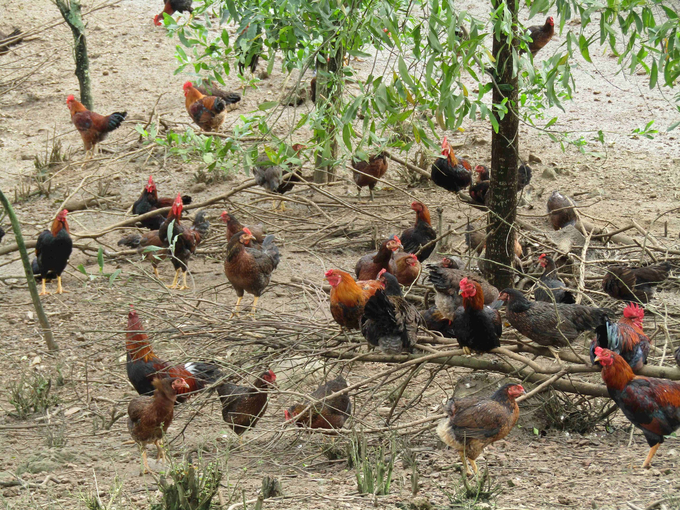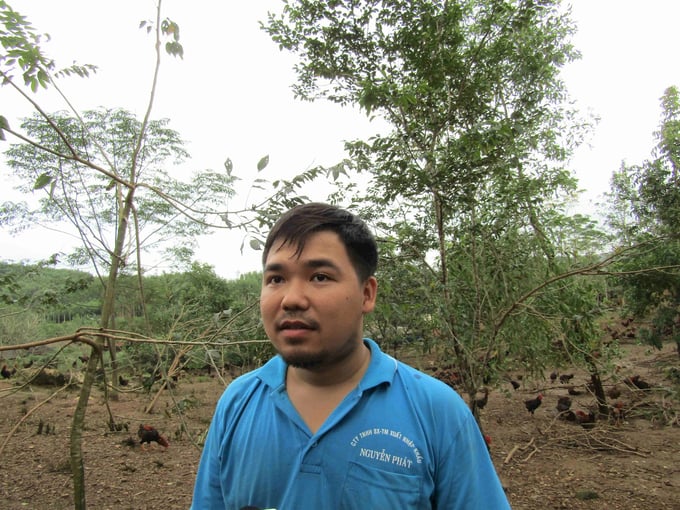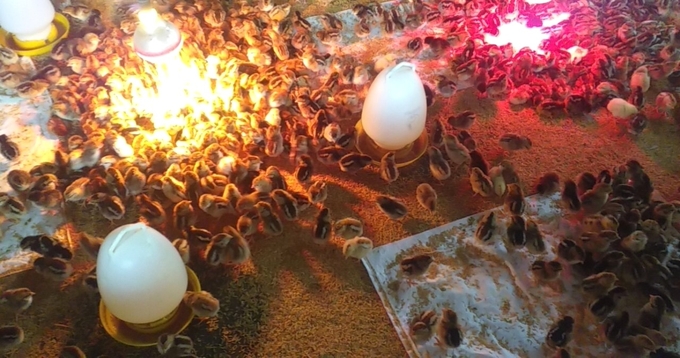May 24, 2025 | 16:23 GMT +7
May 24, 2025 | 16:23 GMT +7
Hotline: 0913.378.918
May 24, 2025 | 16:23 GMT +7
Hotline: 0913.378.918

Binh Dinh is promoting hill chicken farming. Photo: V.D.T.
In early August 2022, Binh Dinh People's Committee issued Decision No. 41/2022/QD-UBND stipulating policies to encourage hill chicken farming in the period 2022 - 2026. This policy applies to individuals and organizations participating in raising chickens in three mountainous districts of Van Canh, Vinh Thanh, An Lao and two midland districts of Tay Son and Hoai An.
Binh Dinh's policy for the development of hill chicken farming offers many solutions to support farmers, which include funding to build a hygienic barn system, transfer of technical farming procedures, and assistance in the establishment of production - consumption link chains for hill chicken products.
Accordingly, Binh Dinh Department of Agriculture and Rural Development assigned the Sub-department of Livestock Production and Animal Health to develop and complete a set of appropriate technical procedures to transfer to livestock farmers. Localities that benefit from the policy encouraging hill chicken farming in Binh Dinh see this as a great opportunity for people living along the forest edge to participate in animal husbandry, thus opening up ways to develop economically and add more key products for the local agricultural industry.

Hill chicken farmers in Hoai An district (Binh Dinh) want to develop but the process faces some complications with the Law on Forestry. Photo: V.D.T.
Le Ha An, Head of the Office of Agriculture and Rural Development of Tay Son district, said that Tay Son is encouraging the planting of large timber forests. Households eligible for support can raise chickens on the hills under the canopy of large timber forests, which will result in an additional source of income to cover their family's living expenses. "This policy helps Tay Son soon complete the criteria for production development in the mountainous area of Vinh An commune, creating livelihoods for ethnic minorities here," An said.
The policy took effect from mid-August 2022 but was not implemented until June 2023. Due to the increase in animal feed prices while the selling price of products decreased, most farmers in Binh Dinh area became cautious in re-investing poultry herds.
“The biggest difficulty in developing hill chicken farming in the area at the moment is the adverse fluctuations in market prices and chain linkages. In the near future, Binh Dinh agricultural industry will continue to call for businesses inside and outside the province with enough potential to participate in the production - consumption link chain of hill chicken products. When they see open opportunities and stable product consumption, people will certainly participate in the link chain more and more," said Tran Van Phuc, Director of Binh Dinh Department of Agriculture and Rural Development.
Hill chicken farming without a specific set of regulations may have some contradictions with the Law on Forestry. According to Director of Binh Dinh Department of Forest Protection Le Duc Sau, Clause 2, Article 25, Decree 156/2018/ND-CP dated November 16, 2018 of the Government stipulates: “Regarding protection forests, owners forests and parties contracted for stable forest management and protection (households, individuals, and local communities) are allowed to intercrop agricultural crops and non-timber forest products, or perform livestock production and aquaculture under the protection forest canopy but must not reduce the forest area or affect the quality, regeneration capacity and protection capacity of the forest”.
As for production forests, Clause 2, Article 30, Decree 156/2018/ND-CP dated November 16, 2018 of the Government states: “For forested areas, forest owners can intercrop agricultural crops and non-timber forest products, or perform livestock production and aquaculture under the forest canopy but must not reduce the forest area or affect the quality and regeneration capacity of the forest”.

When the chickens first come to the barn, farmers need a covered space to brood the chicks, but building a barn on forest land violates the Law on Forestry. Photo: V.D.T.
According to Huynh Ngoc Diep, Director of Binh Dinh Sub-department of Livestock Production and Animal Health, the problem is that hill chicken farming means raising chickens on the hill. Even if this is a type of free-range farming, herd owners need a barn so that in the early stages, when they first buy the breed, they have a place to brood the chicks.
“When the chickens grow up, they are free to forage in the wild as it is a way to reduce input costs. They will have better meat quality than chickens raised in captivity, but when it rains, they still need to a barn to stay in. The barn also has the task of blocking the wind at night, preventing the intrusion of insects to ensure the health of the chickens and serving as a place to store feed. However, the act of building barns will contradict some regulations in Decree 156/2018/ND-CP dated November 16, 2018 of the Government concerning a number of articles of the Law on Forestry," said Diep.
In reality, the locals mainly raise chickens on a small scale with short farming periods of 3 - 4 months, so there is no need to build solid barns. The barn is also built on vacant land instead of forested land, it does not change the current state of the land being used, nor does it affect the forest.
Binh Dinh Department of Agriculture and Rural Development has proposed to the People's Committee to allow households involved in hill chicken farming to commit to building temporary barns. As for large chicken farming projects that require the erection of solid barns, warehouses, and guard houses on hill land, only when the competent authority agrees to change the forest use purpose to another purpose can the project be initiated.
Translated by Samuel Pham

(VAN) The People's Committee of Tra Vinh province has approved an adjustment to the investment policy for the Green Hydrogen Plant project, increasing its area to approximately 52.76 hectares.
![Reducing emissions from rice fields: [2] Farmers’ commitment to the soil](https://t.ex-cdn.com/nongnghiepmoitruong.vn/608w/files/news/2025/05/05/dsc08881jpg-nongnghiep-140632.jpg)
(VAN) Clean rice cultivation model in Thuong Tan commune, Bac Tan Uyen district, is assisting local residents in achieving sustainable agriculture by substantially reducing costs, increasing productivity, and protecting the environment.

(VAN) At the conference to disseminate Resolution No. 68, AgriS introduced its digital agricultural ecosystem and reaffirmed its commitment to accompanying the Government in promoting private sector development and sustainable agriculture.

(VAN) 'Blue Ocean - Blue Foods' initiative is designed to restore marine ecosystems and establish sustainable livelihoods for local communities by cultivating a minimum of 1,000 hectares of cottonii seaweed in the first three years.
/2025/05/21/4642-3-112707_603.jpg)
(VAN) The V-SCOPE project has made direct contributions to three out of six pillars of the Comprehensive Strategic Partnership between Vietnam and Australia.

(VAN) Facing the threat of rabies spreading to the community, Gia Lai province urgently carries out measures to vaccinate dogs and cats on a large scale.

(VAN) Disease-free livestock farming not only protects livestock herds but also stabilizes production and livelihoods for many farmers in Tuyen Quang.